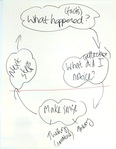|
‘If the blade is not kept sharp and bright, the law of rust will assert its claim.’ (Orison Swett Marden) ‘Clients value moments when a (coach) listens in a way that allows them to know that they are being heard, shares a relevant reflection, or asks a question that makes it possible to see an issue from a different perspective. By contrast, the hope that (coaching) might make a positive difference may be terminally undermined by selective or inattentive listening, awkward or self-serving personal disclosures or interrogative lines of questioning.’ (Julia & John McLeod, The Significance of Being Skilful, Therapy Today, BACP, November 2022). Writing in the context of counselling and therapeutic practice (which I have taken the liberty of re-applying to coaching here), McLeod and McLeod comment that practitioners often associate skills practice with training at the start of their career, rather than with an on-going development journey throughout their career. Many of the skills themselves are common to ordinary human relationships. ‘(Coaching) skills can be understood as comprising the application of generic interpersonal and communication skills for a specific purpose.’ It's as if an effective coach takes normal skills, hones them to a very high standard, then applies them intentionally and in a focused way to enable change with-for a client. A challenge lays in how to do this well, with wisdom and discernment, given that there are so many dynamically-complex factors in a client relationship and context that can fundamentally influence what the client will experience as beneficial. ‘The implementation of a skill in a real-life situation requires a capacity to improvise in response to what is happening in the moment.’ This is where on-going critical reflection and development is so important, perhaps with a supervisor or mentor or in an action learning set. ‘By creating opportunities for revisiting deeply ingrained ways of relating to others, the process of developing (coaching) skills can be both emotionally challenging and life-enhancing…(including) a capacity to maintain skilful and responsive contact with clients in situations of emotional pressure, such as the client becoming demanding, angry with the (coach) or withdrawn.’ I agree. So – how do you stay sharp?
25 Comments
Better to be on the edge than on the fence? There are times and places where diplomacy is the best option. There are, too, roles and situations in which a degree of neutrality is essential to enable a successful outcome. Coaching, mediation, group facilitation and process consultation are good examples. To become too embedded or embroiled is to lose the value that relative independence can bring. Yet, in spite of this, the most radical change often takes place at the bleeding edge.
What does that mean? At times it’s about leadership, taking a firm stance based on our beliefs and values, no matter how unpopular that may be or make us. This sometimes involves taking a counter-stance to prevailing received-wisdom, culture and norms. We associate various graphic metaphors with this approach, e.g. cutting edge; cut-through. The bleeding can result from the reaction, the push-back, the potential personal and professional cost. To take a stance can be and feel bruising. At times it’s about being authentic, congruent and revealing our proverbial cards. ‘This is my stance on this issue. Let’s discuss how we can manage the boundary together so that it works positively for our relationship’ is very different to, ‘I don’t have a view on this’ or, ‘I don’t want to reveal my stance in case it impacts negatively on our relationship.’ The former can build trust; the latter may leave a person or a group suspicious or unsure. In my experience, this can be a sharp edge to negotiate. How do you handle disclosure and stance in your professional relationships? How close do you get to the bleeding edge? Coaching has become increasingly well-defined over recent years, particularly owing to great efforts by e.g. the International Coach Federation and European Mentoring & Coaching Council to clarify, advocate and promote core professional standards and ethics. I believe that, on the whole, this has been a useful development. It adds credibility to the field and, in principle, focus, parameters and accountability for those who study, train and practice within it.
There are challenges too, not least the process and cost of credentialing to be recognised by the professional bodies. This can be prohibitive for practitioners who don’t have access to the time or financial resources to do this in spite of having, potentially, extensive knowledge, skill and experience in the coaching arena. The risk here is that increasing professionalism leads to increasing exclusivity, dictated more by economic circumstances than passion or expertise. There are wider and deeper questions. Coaching is without doubt a powerful field of research and practice that can make a very significant impact. Its focus on reaching goals and solutions can enable people to live and work with greater focus, better ideas and higher levels of commitment. I have felt and witnessed it so many times that I am beyond need for convincing. Yet, as I read and speak with fellow coaches, it often feels like something important is missing. How far are our coaching assumptions, models and approaches (e.g. vis a vis personal efficacy and choice) appropriate to non-Western cultures - yet applied uncritically? How well do we enable clients to grow in insight and resourcefulness as reflective practitioners – beyond reaching goals or solving issues? How willing are we to raise and challenge systemic implications of client choices – e.g. for families, teams, organisations and wider cultural groups? Am I alone? What do you think? I met with a group of leaders last week whose roles include mentoring, supervision and pastoral support. The focus of our time together was how to learn and use a coaching approach to enhance the work they do with people and groups. In the midst of conversation, some said they would be interested to hear more about reflective practice and how to do it using coaching skills. Time was short so I hastily scribbled a reflective practice cycle on a flipchart. It draws on work by Argyris, Schon and Honey & Mumford. I explained that there are at least two ways we can think about this. Classical educationalists often start from a focus on theory, core principles etc. (and, in this group’s case, theology) and then move on to look at how to apply the theory to practice. By contrast, reflective practice often starts from observation of an experience (or experiment), then moves on to reflection on that experience, then to consider how it resonates with, challenges or informs a hypothesis or theory. This implies critical thinking and by extension, aims to guide future practice. In this sense, it shares common principles with related fields such as action research. And so how to apply a coaching approach… 1. Contracting: What are we here to do? How shall we do this? 2. Observation: What happened? What were you aware of? 3. Awareness: How did you feel? What assumptions were you making? 4. Sense-making: What surprised or confused you? How does it fit (or not) with what you know/believe? 5. Learning: ‘What have you discovered in this? 6. Action: And so..? What next? |
Nick WrightI'm a psychological coach, trainer and OD consultant. Curious to discover how can I help you? Get in touch! Like what you read? Simply enter your email address below to receive regular blog updates!
|






 RSS Feed
RSS Feed